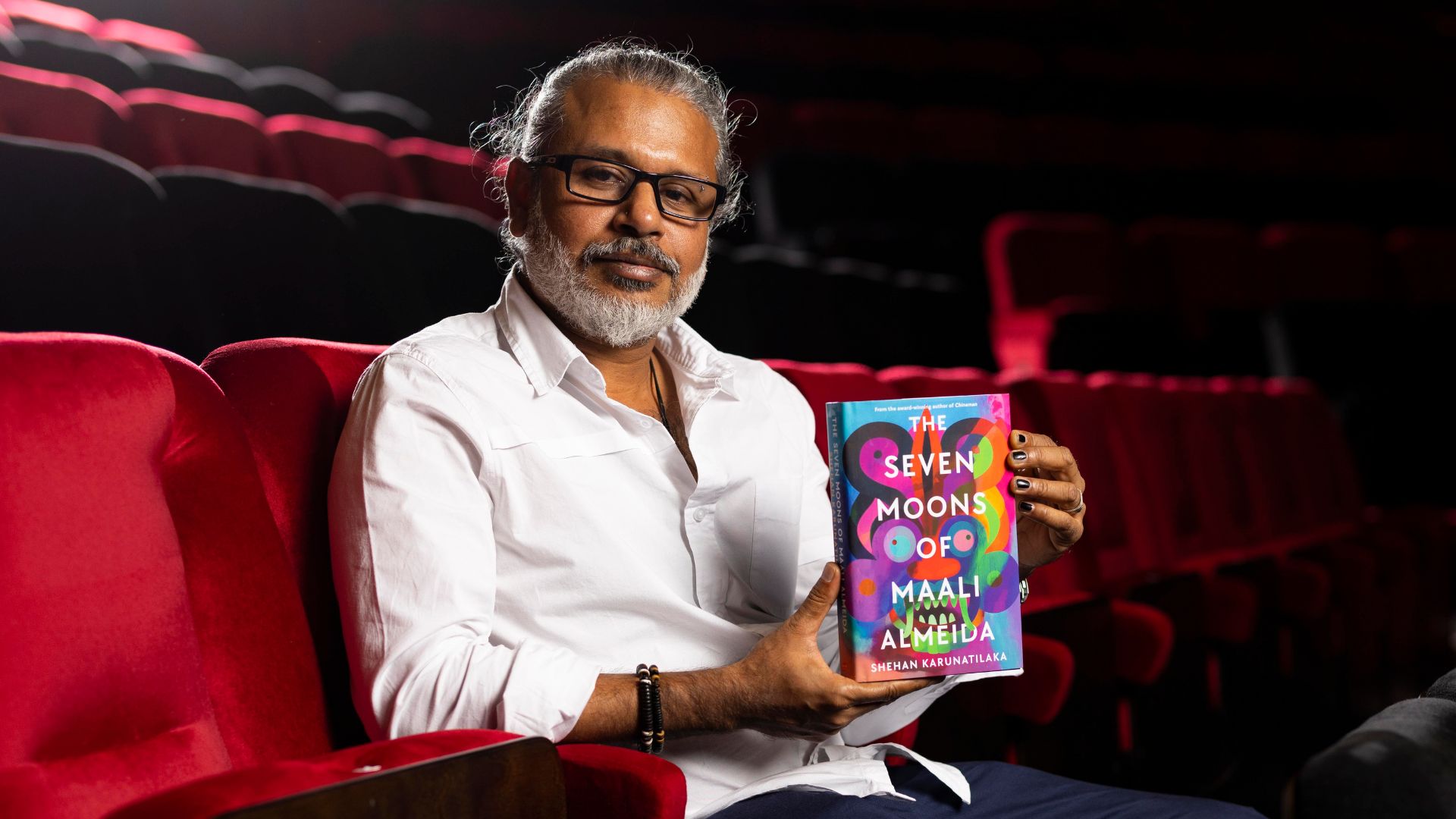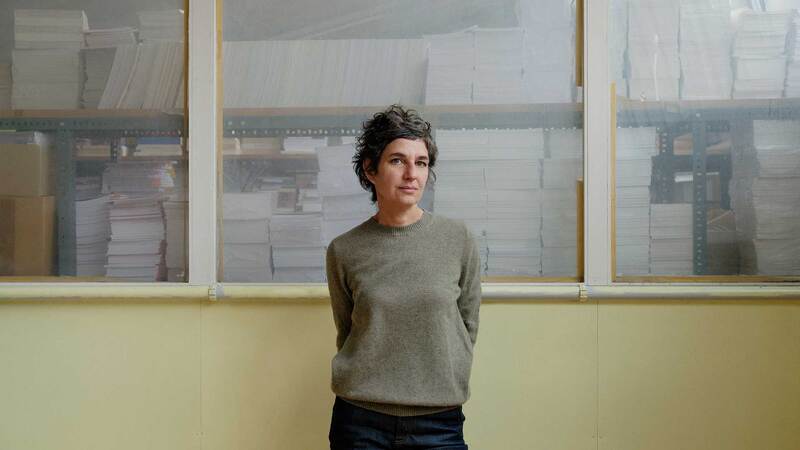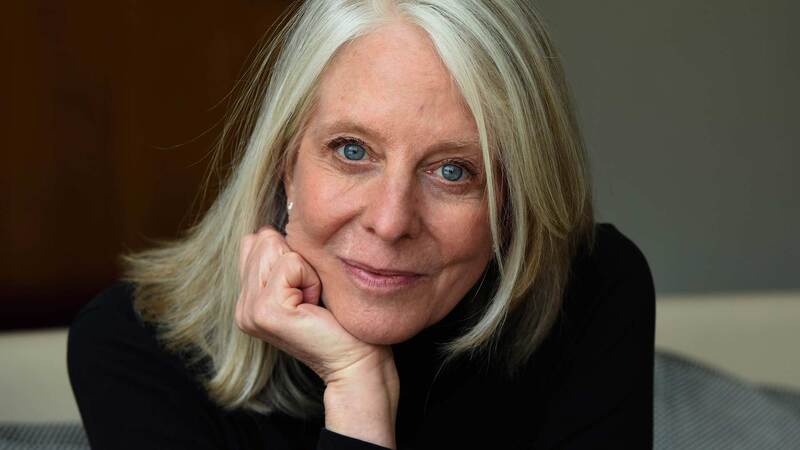You are viewing your 1 free article this month. Login to read more articles.
Booksellers hail Karunatilaka's Booker Prize win for 'triumphant' The Seven Moons of Maali Almeida
Shehan Karunatilaka’s The Seven Moons of Maali Almeida (Sort Of Books) has won the Booker Prize, with his victory hailed by booksellers and critics alike, although it caught many by surprise.
The Sri Lankan writer was crowned the £50,000 prize-winner at the first fully in-person event at the Roundhouse by last year’s winner Damon Galgut. Karunatilaka was presented with his trophy by Her Majesty the Queen Consort in a new-look ceremony featuring a keynote speech by singer-songwriter Dua Lipa and hosted by comedian Sophie Duker.
Karunatilaka is the second Sri Lankan-born author to win the Booker Prize following Michael Ondaatje in 1992. He emerged on the world literary stage in 2011 when he won the Commonwealth Prize for his debut novel Chinaman (Vintage), which was also selected for the BBC and The Reading Agency’s Big Jubilee Read last year.
Karunatilaka writes rock songs, screenplays and travel stories. The Seven Moons of Maali Almeida is his second novel and explores life after death in a noir investigation set amid the murderous mayhem of a Sri Lanka beset by civil war. The book is set in Colombo, 1990. War photographer Maali Almeida is dead, and has no idea who has killed him. He has seven moons to try and contact the man and woman he loves most and lead them to a hidden cache of photos that will rock Sri Lanka. It has been described by the Booker Prize judges as a “whodunit and a race against time, full of ghosts, gags and a deep humanity”.
Accepting the prize, Karunatilaka said: "My hope for Seven Moons is that in the not too distant future [...] that it is read in a Sri Lanka that has understood that these ideas of corruption and race baiting and cronyism have not worked and will never work." He went on to speak to "the people of Sri Lanka" in both Tamil and Sinhalese to "keep telling our stories [...] and sharing our stories". He later told journalists this was "because we tend to in Sri Lanka forget the past and not talk about it and I thought that was the purpose of this, to dig up harsh periods in our history".
Neil MacGregor, chair of the 2022 judges, said: “Any one of the six shortlisted books would have been a worthy winner. What the judges particularly admired and enjoyed in The Seven Moons of Maali Almeida was the ambition of its scope, and the hilarious audacity of its narrative techniques. This is a metaphysical thriller, an afterlife noir that dissolves the boundaries not just of different genres, but of life and death, body and spirit, east and west. It is an entirely serious philosophical romp that takes the reader to ’the world’s dark heart’ — the murderous horrors of civil war Sri Lanka. And once there, the reader also discovers the tenderness and beauty, the love and loyalty, and the pursuit of an ideal that justify every human life.”
MacGregor told journalists the decision was “unanimous” and said the judges admired the book’s “ambition, the scope, the skill, the daring, the audacity and the hilarity of the execution. It seemed to us in scale to be greater than any of the others, and in the variety of registers deployed and the skill with which language is used and the confidence with which it shifted genre from noir thriller to philosophical meditation to hilarious whodunit. It’s really outstanding. We’ve all read it three times. We think it’s a book that will last and that is one of the criteria of the Booker Prize, a book that will go on being read and go on being worth reading.”
At a press conference following his win Karunatilaka reflected on the political situation in Sri Lanka today. He told journalists he had discarded and "self-censored" a couple of short stories after author Salman Rushdie was stabbed in August, having faced years of death threats for his novel The Satanic Verses (Vintage), which some Muslims see as blasphemous.
"I was in the process of publishing a collection of short stories when this incident happened, and I discovered a couple which I don’t think was offensive to any religion," Karunatilaka said.
"But my wife said, can you not do that? You’ve got two young kids. This story is not that good. Just leave it out."
He added that "this is something that hangs over all of us if we’re writing in South Asia, especially writing about politics or religion".
Gaby Wood, director of the Booker Prize Foundation, said: “This year’s Booker judges have formed an incredible team. At their final meeting they were sad to disband, and to be separated from the books that had kept them company. They had come to find that reading, a private act, had become bigger and richer when it was done in a group, and as they showed one another what each of the novels they read could be.
“The 170 novels they read originated in many parts of the globe. ‘We’re going to show that you can find a diamond anywhere in the world,’ said one of the judges. Finally, their longlist of 13 undiminished in spirit, they settled on a single gem: a book they were excited to press into the hands of readers everywhere. My thanks to the judges, and all joy to the Booker Prize 2022 winner, Shehan Karunatilaka.”
The Seven Moons of Maali Almeida has sold 3,874 copies in hardback since its publication in August via Nielsen BookScan in the UK. As the winner, he can expect instant international recognition and a dramatic increase in global sales. Last year’s winner The Promise by Damon Galgut (Chatto & Windus) saw sales increase 1,925% in the UK after the announcement.
Mark Ellingham, publisher at Sort Of Books, told The Bookseller the indie press was "absolutely overjoyed for Shehan". He said Karunatilaka sent the first draft of The Seven Moons to Sort Of Books after it was rejected by the big publishers, and although the indie felt it needed "a little bit of work to make it more somewhat more accessible for a UK readership" they thought it was "a great book".
The publisher has provisionally ordered reprints. Ellingham told The Bookseller: "I think we’ve ordered 20,000 more hardbacks, so I think our decision is when we go to paperback really." He went on to praise the strength of indie publishing at the moment. "A lot of them have been on the Booker shortlists like Galley Beggar and Fitzcarraldo who I really respect enormously. I think they just work better with authors. We all work a little bit harder."
Bea Carvalho, Waterstones head of fiction, told The Bookseller: “We’re thrilled that Shehan Karunatilaka’s fiercely inventive novel has won 2022’s Booker Prize. A triumphant, epic feat of imagination and wisdom which dissects a dark period of our recent history with satire and panache, The Seven Moons of Maali Almeida announces Karunatilaka as a dazzlingly bright star of global literary fiction, cementing the reputation of his brilliant debut. We’re delighted that this well-deserved win will introduce Shehan’s beautiful writing to so many more readers: they’re in for a treat.”
Many indie booksellers were surprised but pleased with the win. Jo Coldwell, at Red Lion Books in Colchester, said: "The Booker Prize is the prize that keeps giving. As a bookshop, and as readers, we follow it avidly, starting with the longlist. This is when we have free rein to express our personal preference, with staff members gravitating towards different titles. As the shortlist date approaches, we place our bets on what may go onto the list. This year we were mostly wrong. This wasn’t to do with the quality of the books and more to do with what we were drawn to initially.
"The shortlist opens up the fun again with our focus being refreshed. We have been working through them but as luck would have it, we haven’t read the winning book but as I say, the Booker is the prize that keeps on giving and our focus is all over the prize with regard to reading it, stocking it and selling it. I’m excited that I haven’t read it yet and look forward to it!"
Hazel Broadfoot at Village Books in Dulwich, London, agreed: "Well yet again me and my team failed to predict the winner of the Booker Prize," she said. "I’m so pleased for Sort of Books - it’s an imprint that I admire hugely and I hope the prize brings lots of new readers for Shehan Karunatilaka. I think this choice will drive sales in bookshops."
The winning book was picked from a shortlist featuring NoViolet Bulawayo’s Glory (Chatto & Windus), Percival Everett’s The Trees (Influx Press), Alan Garner’s Treacle Walker (Fourth Estate), Claire Keegan’s Small Things Like These (Faber) and Elizabeth Strout’s Oh William! (Viking). MacGregor said all the books on this year’s shortlist centred around the question “what is the importance of an individual life?”.
Critics were generally effusive in their praise for the winner. Writing in the Telegraph, Cal Revely-Calder called it "the most assured work on the shortlist". He wrote: "Karunatilaka’s The Seven Moons of Maali Almeida was my pick, and deserves the win, as does its indie publisher Sort Of Books. The most assured work on the shortlist". He said: "It handles personal joys and agonies – and the way they open onto caste, and sexuality, and politics – with unobtrusive skill. No novel is ’complete’, exactly, but this may be as close as they get."
In reviews of the book, the Times called it "an unexpectedly exhilarating read, the sort of literary workout that puts us through our paces, but always with a kindly authorial eye as to what we’ll find rewarding rather than merely punishing" while Justine Jordan in the Guardian described it as "a novel that combines cosmic vision with down-to-earth humour and hard-won heart".
In the Independent, Martin Chilton said he understood the judges’ decision but would have preferred Keegan’s Small Things Like These to win. However, he added: "Hopefully, the Booker will stimulate sales of all the books. And, in the midst of chaotic, bewildering times, Karunatilaka’s novel offers the opportunity to understand what is transpiring in a troubled part of the world, with compelling things to say about the nature of conflict and the importance of an individual life."





















